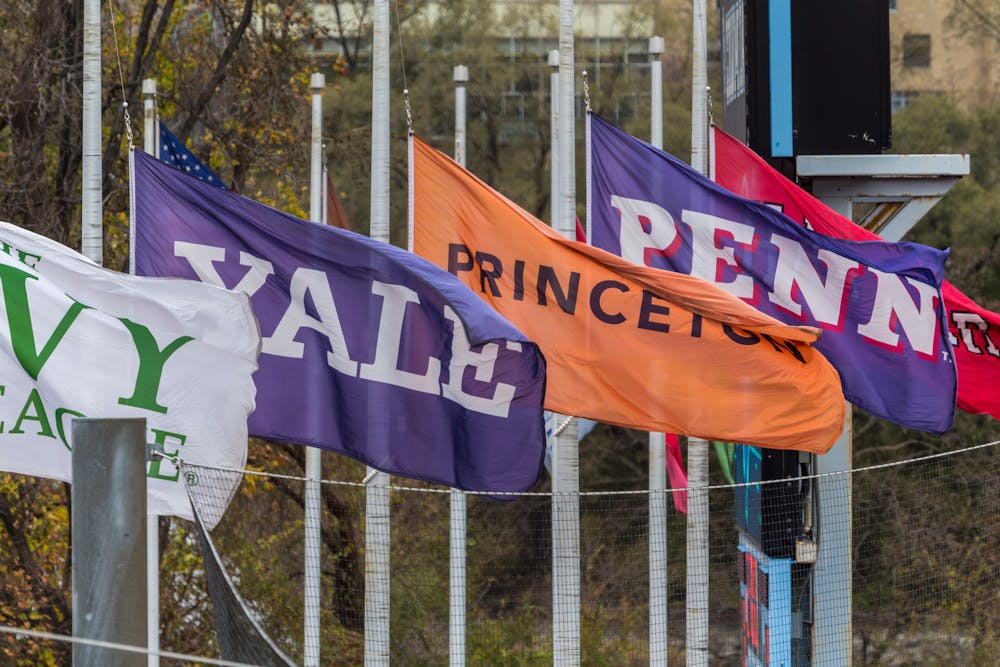
It is often said the Ivy League is a conference dominated by tradition. One that, even in the face of a changing world, often remains rigid in its ways and traditions.
This manifests itself in a variety of ways, but for football teams across the Ancient Eight one of the most costly is the conference’s refusal to join the postseason party. The Ivy League is one of three conferences in the Football Championship Subdivision that does not send their champion to the FCS Playoffs.
This is not the result of the league’s inability to compete; plenty of Ivy squads have been ranked among the FCS’s best in recent years, most notably Princeton’s No. 9-ranked finish in 2018. Rather, it is a result of a longstanding agreement that precludes the Ancient Eight from the football postseason, denying both the conference, its member schools, and its players the chance to perform on the national stage.
The Ivy League’s self-imposed exclusion stems back to a pact signed by the presidents of its eight constituent schools in 1945: the Ivy Group Agreement. This document set in place many of the principal pillars that the conference upholds to this day, including the refusal to administer athletic scholarships. But the agreement also prohibited Ivy League schools from participating in postseason football, with the academic pressures of the end of the fall semester being a driving factor in the decision. Essentially: students can’t keep playing, they have finals to take.
This way of thinking is outdated, particularly given its inconsistency with regard to the conference’s general athletic principles. The Ancient Eight prides itself on the idea that athletes are just like other students — Ivy League executive director Robin Harris once said that the conference is “built upon the foundational principle that student-athletes should be representative of the wider student body.” And while the constituent schools do plenty to support their athletes’ academic pursuits, there are certain hurdles that cannot be cleared.
For every excused class absence athletes are afforded, there is an assignment they are forced to work ahead on because of a game. For every final they are able to study properly for because their season is over, there is a midterm for which they do not have the same luxury. Regardless of what position the conference brass takes, athletes are already held to a higher standard than the average student. Ending the season early does not change that reality.
It is also worth noting that many other Penn teams are permitted to compete in postseason action, with several tournaments taking place during similarly critical academic periods. Last season, the Ivy League men’s and women’s lacrosse tournaments took place from May 5-7, and Penn’s final exam period spanned from May 1-9. Should the Quaker teams have been forbidden from competing? No. Rather, it was evident that the cost of accommodating this conflict did not outweigh the benefit of allowing the players to compete. Should the same logic not be extended to the gridiron?
Penn junior quarterback Aidan Sayin recently came on the Quaker Nation podcast to discuss the Quakers’ season so far and his aspirations for the year at large. When discussing how the football players support other sports teams at Penn, Sayin emphasized the talent level throughout Penn athletics as well as the Ivy League’s status as a legitimate Division I conference. When I asked him about his thoughts on the conference’s exclusion from the FCS playoffs, he did not hold back.
“I’ve actually written papers about this for classes here,” Sayin said. “You know, it’s awful, but I don’t know what I can do about it necessarily…We wanna be able to play in that playoff, and every year there’s at least one team from the Ivy League that’s ranked high enough that would be in it. It would be a great opportunity to be able to go do that.”
I believe Sayin’s feelings are likely not unique among a group of players who, for their entire football careers, have been motivated by their pursuit of the ultimate goal in sports: a championship. While the Ivy League title is certainly an objective to shoot for, nearly every college athlete across the country begins the season with a dream of holding a national championship trophy. Why are Ivy League football players forbidden from that dream?
When the FCS Playoff was created in 1978, it was done with that very goal in mind: of giving the whole of Division I football a championship to chase. And while the Ivy League’s standards may be older, that does not make them any less antiquated. For the sake of consistency, and for the sake of the players that make the conference possible, it’s time for the Ivy League to catch up.
WALKER CARNATHAN is a sophomore and current deputy sports editor studying English from Harrisburg, Pa. All comments should be directed to dpsports@thedp.com.
The Daily Pennsylvanian is an independent, student-run newspaper. Please consider making a donation to support the coverage that shapes the University. Your generosity ensures a future of strong journalism at Penn.
Donate




